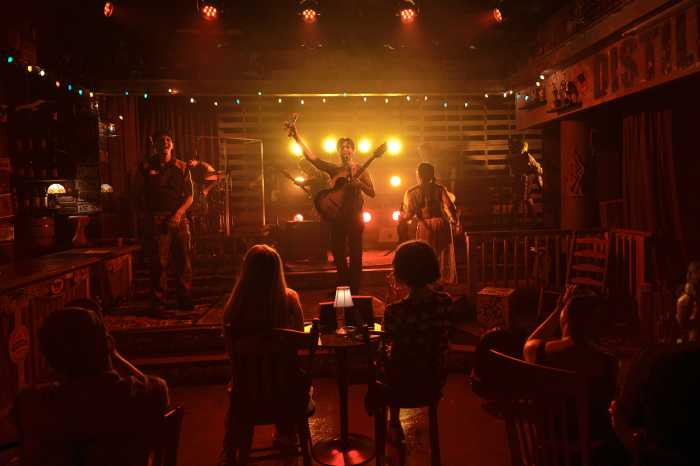Chantal Akerman’s identity as a Jewish Belgian lesbian informs her films in varied ways, but her work shows remarkable resistance to being pinned down. At one point, she refused to allow her films to be shown in gay and lesbian festivals.
Still, she made her 1975 masterpiece “Jeanne Dielman,” revived at Film Forum and released on DVD last year by Criterion, with an all-female crew and described it herself as a feminist exploration of subjects –– such as a woman’s devotion to housework –– never seen before in cinema. She’s worked all over Europe, as well as in the US, Mexico, and Israel.
New DVD set offers Jewish Belgian lesbian’s most productive years
Until recently, her work has been hard to catch on DVD, but Criterion has followed up its release of “Jeanne Dielman” with a three-DVD set, “Chantal Akerman in the Seventies.” Containing one short, one hour-long film, and three features, it compiles all her remaining work from her most productive decade. Her unique mixture of narrative, avant-garde, and documentary influences was apparent from the very first; no one else made films like hers.
The most experimental film in this set, “Hotel Monterey” is also the only one that could reasonably be called derivative. Drawing on North American avant-garde directors Michael Snow and Ernie Gehr, Akerman and cinematographer Babette Mangolte shot a day in the life of an Upper West Side hotel. Paradoxically, the film alternates between breathtaking beauty and tedium. Akerman demonstrates a painterly eye –– the DVD does justice to the film’s glossy look and rich, saturated colors –– but she uses very long takes without the seductive rhythms developed in her later films.
Like “Hotel Monterey,” “Je Tu Il Elle” is a buildup toward the breakthrough of “Jeanne Dielman,” but taken on its own, it’s less successful. It revolves around Julie (Akerman), a bored young woman who spends the film’s first half hour rearranging her furniture, bingeing on sugar, and writing letters. In the latter two-thirds, she goes on the road with a truck driver, giving him a hand job, and meets up with an ex-girlfriend, which leads to a ten-minute sex scene.
The black-and-white cinematography is often harsh and ugly, although Akerman’s penchant for striking images remains strong. “Je Tu Il Elle,” however, is largely notable for showing explicit lesbian sex without the male-centered voyeurism of most pornography.
“News From Home” is a high-concept documentary. Shot in 1976, it combines images of New York with a voice-over consisting of Akerman reading letters from her mother. (The DVD offers the option of hearing Akerman speak in English or subtitled French.) At first, the film seems like a predictably icy depiction of urban alienation. Its New York is strangely depopulated. Only on a few occasions –– most of them on the subway –– do people seem conscious of Akerman’s camera. However, the combination of image and soundtrack eventually yields a warmer tone.
Made in the year of “Taxi Driver” and the first Ramones album, “News From Home” captures a pre-gentrification Manhattan, but one that’s also surprisingly free from crime and sleaze. Nostalgic New Yorkers are in for a treat. The passive-aggressive nature of the letters from Akerman’s mother, which constantly plead with her daughter to write more often, seems more threatening than anything she’s likely to encounter in the street.
Not exactly a love letter to New York, “News From Home” brims with ambivalence toward both urban life and the family Akerman left behind in Belgium. It fittingly closes with a farewell to Manhattan, a ten-minute shot taken from the Staten Island Ferrry.
Akerman’s follow-up to “Jeanne Dielman,” “Les Rendez-vous D’Anna,” was widely considered a disappointment upon release in 1978. Seen now, it looks like a minor masterpiece –– the logical culmination of a decade’s worth of experimentation. It’s certainly the slickest looking film in this set, yet it’s grounded in the same avant-garde spirit as “Hotel Monterey.”
The film follows Anna (Aurore Clement), a bisexual director, around Europe as she tours to promote her latest film. There’s no glamour to the profession here, just an endless slog of travel, and “Les Rendez-vous D’Anna” shows little interest in the process of filmmaking itself. Instead, it sets a largely silent, mysterious protagonist against characters delivering dense monologues, including her mother and a German man with whom she has a one-night stand.
The entire film looks as though it were shot under fluorescent light, and all its locations blur together into one interchangeable train station/ hotel. “Les Rendez-vous D’Anna” is a feminist counterpart to Wim Wenders’ ’70s road movies. Many critics have interpreted the film as autobiographical; whether or not that’s true, it sums up a decade of work that, while not always wholly compelling, remained adventurous.
Let’s hope Eclipse eventually turns its eye on Akerman’s ’80s work, which is as strong as “News From Home” and “Les Rendez-vous D’Anna.”
Complete Information:
CHANTAL AKERMAN
IN THE SEVENTIES
Released Jan. 19
Eclipse/ Criterion

































